Hmong Women in Minnesota Timeline
This Timeline is an attempt to capture historically significant achievements and events by Hmong women in Minnesota. Like any such timeline, it is not exhaustive and does not reflect all the contributions of Hmong women to their families and community. The authors hope that it will provide a foundation that can be built upon to more fully reflect the evolution of the community and more comprehensively include the lives of Hmong women in society.
The Timeline’s authors are listed at the end.
1975
- Refugee camps established in Thailand, and Hmong resettlement to countries in the West began.
1979
- Minnesota’s first Hmong women's organization, the Women’s Association of Hmong and Lao (WAHL) was founded, amidst protest from male leaders.
- Mao Thao, Xiong My Ly, Ka Her Vang, True Vang, Yer Yang and other Hmong women became the first group of healthcare interpreters.
1980
- A second Hmong women’s group founded the Association for the Advancement of Hmong Women in Minnesota, which primarily focused on serving women in Minneapolis.
1981
- Sy Vang Mouacheupao became an advocate for victims and survivors of domestic violence, despite receiving death threats from men and male spouses.
- The largest concentration of Hmong (around 45,000) remained in Ban Vinai refugee camp. Women there were well known for their paj ntaub (embroidery and story cloths), which was sold throughout the world to support their families.
1982
- WAHL started domestic violence awareness and services program but community criticism and the funder’s unwillingness to use culturally appropriate approaches forced it to end.
- Mao Thao was invited by the United Nations High Commissioner for Refugees (UNHCR) to talk about life in America to 40,000 Hmong refugees in Ban Vinai camp. She was the first Hmong refugee who visited the Ban Vinai camp.
1984
- Gaoly Yang, first Executive Director of WAHL, established a program to provide social services for elderly women widowed by the Secret War in Laos.
1986
- Phoua Yang became the first Licensed Practical Nurse (LPN).
- Mao Thao, Va Thao, Ma Moua, and Mee Yang were among the second wave of Hmong women who graduated with Licensed Practical Nurse and Clinical Nurse Specialist degrees from St. Paul Technical Vocational Institute (now Saint Paul College).
- First Hmong women’s scholarship fund created by Women’s Association of Hmong and Lao.
1989
- As President of WAHL, Phoua Yang chaired the Hmong New Year and decided to divide profits evenly between all other organizing agencies for the first time, which led to angry responses from male leaders. WAHL was never invited to organize the New Year thereafter.
1990
- Phoua Yang co-founded the first Translation/Interpretations Certificate Program at the University of Minnesota.
- Mao Thao, Va Thao, Cha Her, Xia Lor Vang, Soua Vang, Sue Lee, Pam Thao, Yer Thao, and Blia Vang were among those who worked on the 1990 Measles Outbreak in Saint Paul. There was no media outlet to reach the Hmong, so the workers used a mass door knocking campaign, especially in public housing sites in Saint Paul. This effort was the motivation for creating the first Hmong public TV show, Kev Koom Siab.
1991
- Choua Lee elected to St. Paul School Board, the first Hmong elected to any public office in the United States.
1993
- Mao Thao led a group of health workers to research Sudden Unexplained Death Syndrome (SUDS) in Phanat Nikhom refugee camp in Thailand.
1994
- Mai Neng Moua and other writers created Paj Ntaub Voice, a Hmong literary journal.
- Mao Thao started Hmong Health Talk Program through Kev Koom Siab.
- Ilean Her is the first Hmong woman attorney to pass her Minnesota Bar exam.
- Houa Vue Moua published an autobiography of her life and journey to America titled, Trails Through The Mist. She may be the first Hmong woman to do this. Houa now resides in St. Paul.
1995
- KaYing Yang named as executive director of WAHL - the first young and unmarried Hmong woman to head a mutual aid association.
- Pacyinz Lyfoung became the first Hmong American woman attorney to practice law in Minnesota, at Southern Minnesota Regional Legal Services.
- Two Hmong American Women’s Delegations led by Minnesota Hmong women participated in the United Nations Fifth World Conference on Women in China.
- Bea Vue-Benson became first ordained Hmong woman minister in the United States.
- Mao Thao formed the Hmong Health Care Professionals Coalition to provide health education and screening, free flu vaccine clinics, and hosts community health fairs at the July Sports Festivals.
1996
- Dr. Phua Xiong and Dr. Yeng M. Yang became the first two Hmong women in Minnesota to obtain Doctor of Medicine degrees, both from the University of Minnesota Medical School.
- Pacyinz Lyfoung founded and became executive director of Asian Women United Shelter for domestic violence victims and survivors.
- Mee Moua and Xee Vang Thao co-founded the Hmong American Bar Association of Minnesota.
1998
- Bo Thao became executive director of WAHL, and implemented Hmong Women’s Peace, the first Sexual Assault program.
- KaYing Yang named as executive director of the Southeast Asia Resources Action Center (SEARAC)--the first Hmong to head a national advocacy organization for refugees and immigrants from Cambodia, Laos, and Vietnam.
- Bo Thao, MayKao Hang, Gaoly Yang, Mao Thao, Chia Vang and other Hmong women created the Find Bao Lor Fund, named for a Hmong woman who was murdered by her husband. Bao’s body was finally found in 2000.
- Bo Thao and MayKao Hang started the Hmong Women’s Action Team.
- Pom Siab Hmong Theater (now the Center for Hmong Arts and Talent, or CHAT) became the first multi-disciplinary Hmong arts organization. Lee Vang was its first executive director, succeeded by Kathy Mouacheupao in 2005.
- Ilean Kao Ly Her became the first Hmong woman to be named as executive director of the Council on Asian Pacific Minnesotans. Sia Her succeeds Ilean in 2013.
- Mao Thao established the Hmong Health Resource Group (HHRG) at Saint Paul- Ramsey County Public Health after six Hmong children were killed by their mentally disturbed mother at McDonough Homes.
- Zoua Vang is the first Hmong woman news anchor in a mainstream news TV program. Her first reports covered channel 5 (KSTP)’s stories about Khoua Her, the young mother who strangled her six children.
1999
- Bo Thao became executive director of Hmong National Development, the first woman to head a national advocacy organization for Hmong Americans. She and her team successfully led the reauthorization of the Hmong Naturalization Act, the introduction of the Asian American and Native American Pacific Islander Serving Institutions bill that eventually became law, and successful resettlement of the last group of Hmong refugees in Thailand.
- Kashia Moua created Hmong Women's Circle, a program aimed at nurturing Hmong adolescent girls to make well-informed decisions regarding their bodies, education, and future, while respecting and appreciating the Hmong cultural heritage. Through Hmong National Development, Kashia replicated this program in Minnesota, Wisconsin, and California.
2000
- Mao Justice Vang hired by Minnesota Humanities Commission to translate children’s books into both Hmong dialects.
- The Hmong Women’s Action Team completed the Hmong Women’s Oral History Project that documented three generations of Hmong women for the Minnesota Historical Society.
2001
- Kashia Moua, Pakou Hang, Louansee Moua, Thaomee Xiong and a number of other women led Mee Moua’s successful campaign for a seat in the Minnesota Senate - the first Hmong American elected to any state legislature in the United States.
- After September 11, Mao Thao advocated for culturally responsive emergency information to limited English proficient populations in Ramsey County. After the Emergency Community Health Outreach (ECHO) was established, Mao Thao, Pang Y. Rhode, and Ma Tran Moua became hosts on ECHO’s Hmong shows.
- Named a Champion of Health by the Blue Cross Blue Shield Foundation, May Thao-Schuck creates the first Hmong exercise video in the Hmong language to promote health and exercise.
2002
- Dia Cha, Ph.D, became the first female tenured professor at a public university (St. Cloud State University).
- Bea Vue Benson organized the “Lift the Ban” campaign to allow parking around the July Hmong sports festival.
- Pakou Hang named Political Director for Paul Wellstone’s U.S. Senate campaign
- Bamboo Among the Oaks: Contemporary Writing by Hmong Americans, edited by Mai Neng Moua, was published by the Minnesota Historical Society Press.
- KaYing Yang named one of Ford Foundation’s Leaders for a Changing World, recognizing and supporting her leadership to improve people’s lives.
2003
- Kazoua Kong Thao elected to the St. Paul School Board.
- Bao Vang was the first Hmong woman to run (unsuccessfully) for a seat on the St. Paul City Council.
- KaYing Yang and Bo Thao led advocacy effort that successfully opened resettlement to remaining 15,000+ Hmong refugees from Wat Tham Krabok in Thailand. This is the first time refugee policy was successfully changed for the population since the closing of the resettlement program for the Hmong in the late 1990s.
- Attorney Song Lo Fawcett was appointed an adviser to Gov. Tim Pawlenty on Asian American issues in Minnesota.
2004
- KaYing Yang worked with the International Organization for Migration (IOM) and the United States Embassy and led a team of Hmong Americans, Hmong Thai, and other international staff to resettle the last wave of Hmong refugees from Wat Tham Krabok, Thailand. KaYing accompanied the first family from this special resettlement to Minnesota.
- May Kao Hang, Mao Thao Ilean Kaohly Her, Kazoua Kong Thao, and Mo Chang traveled with Mayor Kelly’s delegation to assess the refugees at Wat Thamkrabok, Thailand.
- A group of 16 Hmong women started the nation’s first Hmong Women’s Giving Circle to promote philanthropy and create social change for Hmong women and girls in Minnesota. They supported projects from 2005-2010.
2006
- Kathy Mouacheupao produced the first Hmong Fashion Show called Fresh Traditions, the first "high fashion" show featuring all Hmong designers and Asian models. Fresh Traditions highlights the intersections of Hmong culture, American culture, and fashion through the talent of Hmong artists.
- Kathy Mouacheupao co-hosts and deejays for CHAT Radio, now known as HMONG-FM, the first Hmong radio program in English airing on FM airwaves in Minnesota.
2007
- Bao Vang named as the CEO/Executive Director of Hmong American Partnership (HAP), the largest Hmong non-profit in the country.
- PaKou Hang ran unsuccessfully for a seat on the St. Paul City Council.
- Neng Vue appointed to Saint Paul Human Rights Commission, followed by Kaohly Her in 2008.
2008
- KaYing Yang founded VivNcaug, the first women’s organization in Laos, with support from Hmong American women in Minnesota and Wisconsin.
- Artist Kao Lee Thao opens her exhibit, ECHO, at Pioneer Press Gallery featuring her paintings of Hmong women. Today she continues to use Hmong women as her inspiration creating paintings, design clothing, and create 3D art. She won “Best in Her Show” at the Alternative Media Festival. Her masks and headsets will be featured in the TV series, Reign, on the CW.
2009
- Kao Kalia Yang’s book The Latehomecomer won two Minnesota Book Awards.
- Terri Thao appointed to Saint Paul Planning Commission.
- Vallay Varro won seat on the Saint Paul School Board.
2010
- MayKao Hang named President and CEO of Amherst H. Wilder Foundation.
- May Lee-Yang wrote and produced the play Confessions of a Lazy Hmong Woman.
- Sophia Ntxawm Vuelo opened Vuelo Law Firm, after a decade as a prosecutor and a public defender for Ramsey County and Olmstead County.
- Yamy Vang unsuccessfully bids for Judge in the 10th Judicial District.
- Padee Yang joins 3HmongTV, the Twin Cities’ internet based Hmong TV company that has a global reach, and creates her show Xav Paub Xav Pom.
2011
- Pakou Hang forms the Hmong American Farmers Association, the first organization dedicated to working with Hmong farmers, and becomes its first Executive Director.
- Kaying Thao successfully wins a seat in the Roseville School Board and would unsuccessfully run for the Roseville City Council in 2014.
2012
- Mee Moua named President and Executive Director of Asian American Justice Center, the first Hmong to head a national Asian American civil rights organization.
- Pa Der Vang, Ph.D. helped establish the first Critical Hmong Studies minor at St. Catherine University.
- Bo Thao and Kaohly Her co-founded the first Hmong family “giving circle” in Minnesota, Building More Philanthropy with Purpose (BMPP), to involve families in intentional giving to support projects that advance social justice in Asian American communities in the upper midwest. Since starting BMPP has gifted over $30,000 to Asian American organizations in Minnesota and Wisconsin.
- Boa Lee, a young Hmong Minnesotan, is named as Public Affairs Officer at the United States Embassy in Sierra Leone. In 2015, Boa will be based in the US Embassy in Thailand as a Foreign Service Officer.
- Amee Xiong named interim executive director of Lao Family Community Inc.
- Ka Vang publishes her children’s book, Shoua and the Northern Lights Dragon, a finalist for the 23rd Annual Midwest Book Awards.
2013
- Bo Thao and MayKao Hang co-founded the Coalition of Asian American Leaders, a new Pan-Asian network to build unity and cohesion of Asian Minnesotans.
- Kazoua Kong Thao’s bid for the St. Paul City Council was thwarted by Hmong male leaders, who tried to persuade her to drop out because a Hmong man is running.
- Katie Ka Vang’s play Hmong Bollywood is staged in Minneapolis.
- Bo Thao co-founded Building Our Future: A Global Community Campaign to engage the community to address the issues of domestic violence and abusive international marriages in order to create a healthier and violence-free families.
2014
- At age 85, Lu Lee self-published Ib Lub Neej Tshiab - believed to be the first book by a Hmong woman of her generation.
Timeline: Hmong Women and Minnesota was developed and written by a group of women led by Bo Thao-Urabe, KaYing Yang, Mao Thao, and Gaoly Yang. Contributors also included: Chia Youyee Vang, Kathy Mouacheupao, Sophia Vuelo, May Lee-Yang, Mai Neng Moua, Pakou Hang, Terri Thao, Choua Thao, Louansee Moua, Sy Vang, Dia Cha, Phoua Yang, MayKao Hang, Pa Der Vang, and Bea Vue-Benson.
The authors invite comments, corrections, and additions. Please write hmongwomenmn@gmail.com.
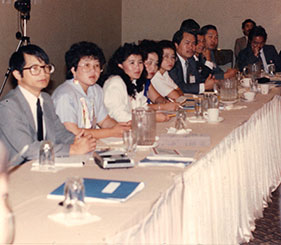
Inaugural meeting of Women’s Association of Hmong and Lao (WAHL), 1979. Courtesy Bo Thao-Urabe.
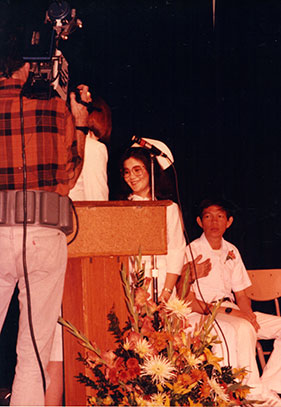
Phoua Yang graduating with LPN. Courtesy Bo Thao-Urabe.
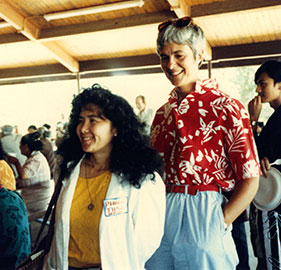
WAHL Elderly Program Celebration, 1988, McDonough Homes Recreational Center, St. Paul. Courtesy Phoua Yang.
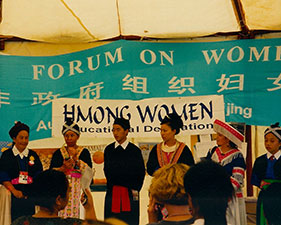
Minnesota Hmong women in China for the 1995 UN World Women's Conference. Courtesy Bo Thao-Urabe.
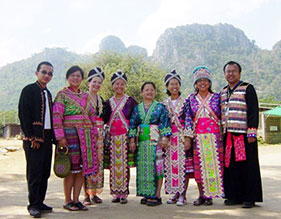
Wat Thamkrabok Hmong resettlement team led by KaYing Yang, 2004. Courtesy Bo Thao-Urabe.
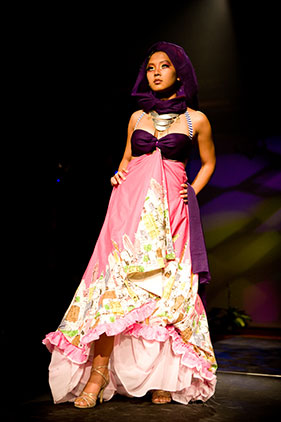
Fresh Traditions fashion show. Courtesy Center for Hmong Arts and Talent.
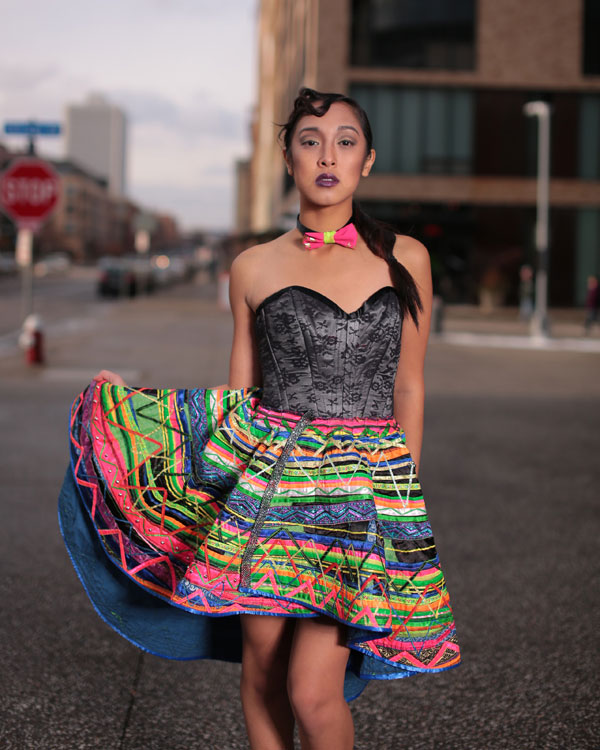
Urban Hi-Low Hmong Skirt. Oskar Ly, stylist. Photo by Cam Xiong. Courtesy Oskar Ly.
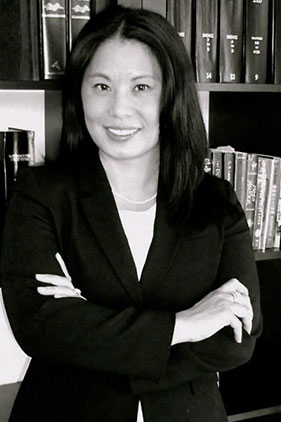
Sophia Vuelo. Courtesy Bo Thao-Urabe.
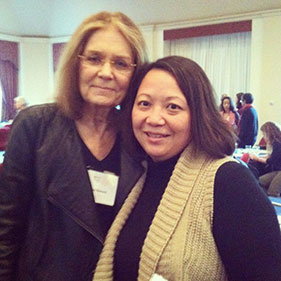
Bo Thao with Gloria Steinem at Move to End Violence. Courtesy Bo Thao-Urabe
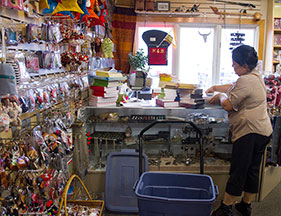
Shoua Xiong at Hmong ABC Bookstore, St. Paul, 2013. Courtesy of the photographer, Yi-Chin Lee, New Hope, MN.

Beaux Ladies in Lights. Oskar Ly, stylist. Photo by Karen Nou Yang, December 2013. Courtesy Oskar Ly.
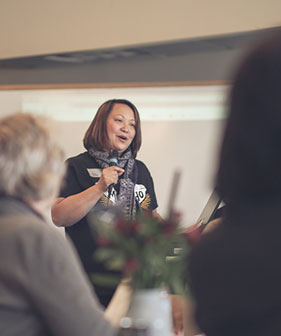
Bo Thao-Urabe at Building More Philanthropy with Purpose (BMPP) Giving Circle Celebration, “Pho the Good of All,” March 15, 2014, Great River School, Saint Paul. Courtesy Chue Zeng Yang.
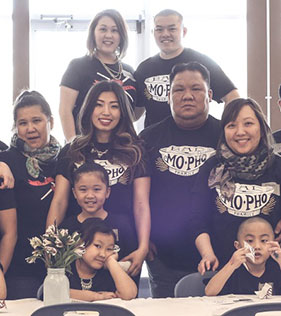
BMPP Giving Circle Families and Volunteers. Courtesy Bo Thao-Urabe.
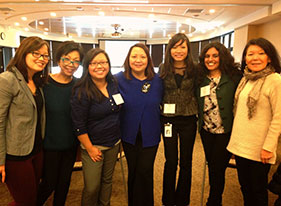
Coalition of Asian American Leaders Forum 2014. Courtesy Bo Thao-Urabe.
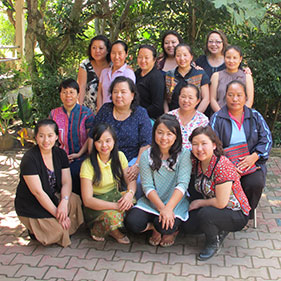
Building Our Future meeting of Hmong women leaders from US, Laos, Thailand, and Vietnam. Courtesy Bo Thao-Urabe.
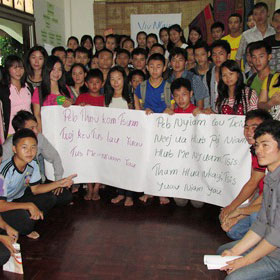
Building Our Future effort in Laos, 2014. Courtesy Bo Thao-Urabe.
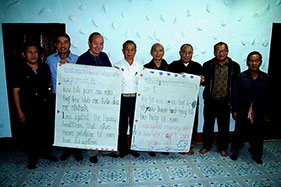
Building Our Future in Thailand, 2014. Courtesy Bo Thao-Urabe.

Sandy’Ci Moua in the offices of CAPI USA, Minneapolis, 2014. Courtesy of the photographer, Yi-Chin Lee, New Hope, MN.
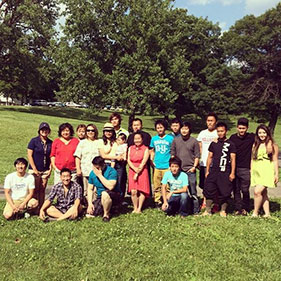
Bo Thao and KaYing Yang with children resettled from Wat Thamkrabok ten years later in Minnesota. Courtesy Bo Thao-Urabe.